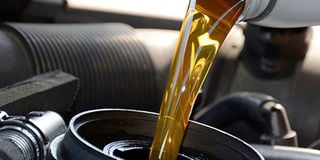Does the type of oil matter?

Engine oil is an important element in maintenance of your car engine. FILE PHOTO
Hi Paul, thank you for the educative work you are doing. I own a Toyota RAV4, first generation with a manual transmission. After reading your articles over time, I have observed that you emphasise that the good performance of an engine will depend on many factors, which include the type of engine oil and service parts used. To a lay man like me, oil is oil. What exactly should I be looking for in the oil that I put in my car and what type should I use? In Kabale where I live, whichever service station I go to, they give me a different type of oil and tell me that it is better than all the others. I am considering going for my next service but I am skeptical. Please help.
Hello, engine oil plays a major role in the maintenance and protection of your engine. The engines in post-1990 vehicles are very sensitive to sludge, deposit and corrosion formation. These engines demand more than just lubrication from the engine oil you choose. You ought to select engine oil which is blended with special additives that prevent sludge build up and keep it in suspension to carry away after burn deposits for filtration over the drain interval. Good engine oil should be designed with corrosion inhibitors to prevent rusting of frequently heated and cooled metallic engine components. Good engine oil is designed to help cool the engine while its detergent additives keep the internal components clean and free of deposits. You can find these attributes in the whole range of Shell motor oils. Identifying the correct engine oil for your RAV4 requires consulting your user manual or in its absence, the Toyota dealer. At Toyota Uganda, they recommend motor oil viscosity grade 15W 40. These numbers can be seen on the motor oil and they represent the viscosity (the ability of oil to flow). The number before W indicates that this oil will maintain its viscosity when running in an engine at cold (sub zero) temperatures below minus 15 degrees centigrade. The number 40 represents the upper temperature limit at which the oil will maintain its viscosity when heated up. When you look at the oil container, you should be able to see the classification ‘S’ which represents ignition by spark for petrol engines. There are 15W40 oils designed for diesel engines with classification ‘C’. The 15W40 multi grade viscosity is often better and safer for your engine than the monograde (SAE 40) because it covers a wider temperature range. I would recommend you use the Shell Helix HX5 15W40. This motor oil meets the above standard and carries all the above attributes necessary to maintain and protect your engine while keeping the environment clean. This Shell lubricant is readily available all over the country and at the nearest Shell station in Kabale.
Paul, I drive a Premio ST190 with a 1.8 litre petrol engine and an automatic transmission. When I start it and it warms up after a few minutes its idling starts to hunt up and down and sometimes stops in traffic. Often, it is difficult to start again. I replaced spark plugs and air cleaner element at the recent engine oil change but the problem persists. Okeny.
Mr Okeny, the Toyota Premio engine erratic idling and frequent stalling might be a malfunction of the throttle valve, which may be sticking due to accumulation of soot. This can be serviced with a carburetor cleaner by any qualified technician. It will be useful to clean the engine idle air control valve (IAC) attached to the throttle with carburettor cleaner as it may be dirty and clogged. This will improve the engine idle quality. I also recommend an immediate replacement of the long-life fuel filter if you have not yet done so. This will ensure an improvement of the fuel pressure. I recommend that you use Shell Fuel Save unleaded petrol, which will improve your engine performance and lasts longer at no extra cost. This fuel has detergent additives, which prevent further buildup of deposits in the fuel injectors and on the engine valves. This ensures efficient delivery of fuel to the pre-combustion port and prevents wastage of fuel usually absorbed by the deposits on the engine valves.
Hi Paul, I drive a Toyota Nadia. But some time ago, I took it to the garage after realising the hand brake light was flashing red even after disengaging it. A day after the garage visit, it developed a screeching sound, which was worked on but the red light has not gone off. What should I do? Joy K
Hello Joy, the Parking (Hand) brake warning light helps a motorist to monitor the condition of your parking brake and brake hydraulic system. The Parking brake (P) warning light will continuously illuminate if your parking brake is not yet disengaged. However, if the ‘P’ release lever is not fully disengaged or has a mechanical fault, the warning light will persist. On rare occasions, an electrical switch or the circuit that actuates the warning light may fail. On the other hand, the persistent Parking brake warning light may be caused by a drop in the brake fluid level in the reservoir or a failure of the brake fluid level sensor on the reservoir cap or its circuit. A competent technician would need to inspect the mechanical, hydraulic and electrical components of the parking brake system to find and fix the cause of this persistent warning light.
Ask the mechanic >
By Paul Kaganzi
0772316145
send sms: mycar (space) your comments and questions to 6933, or email them to [email protected]



